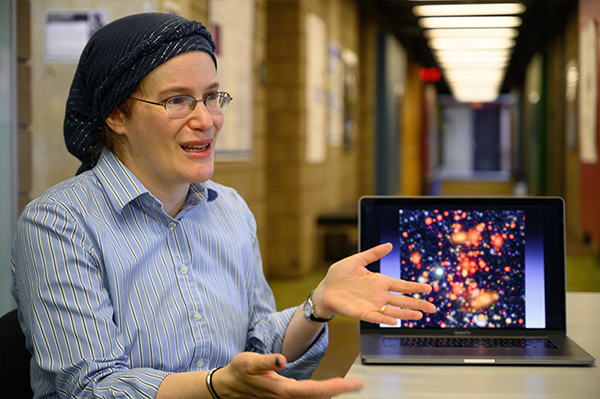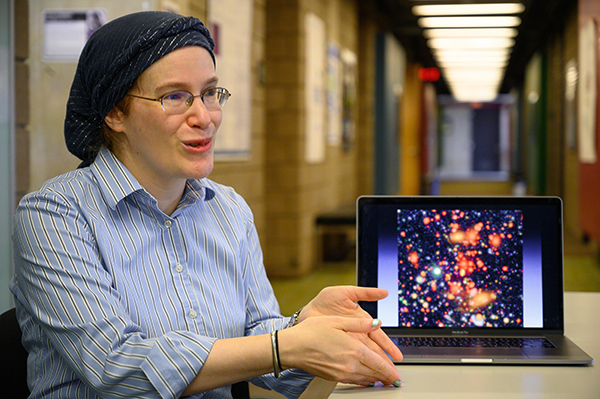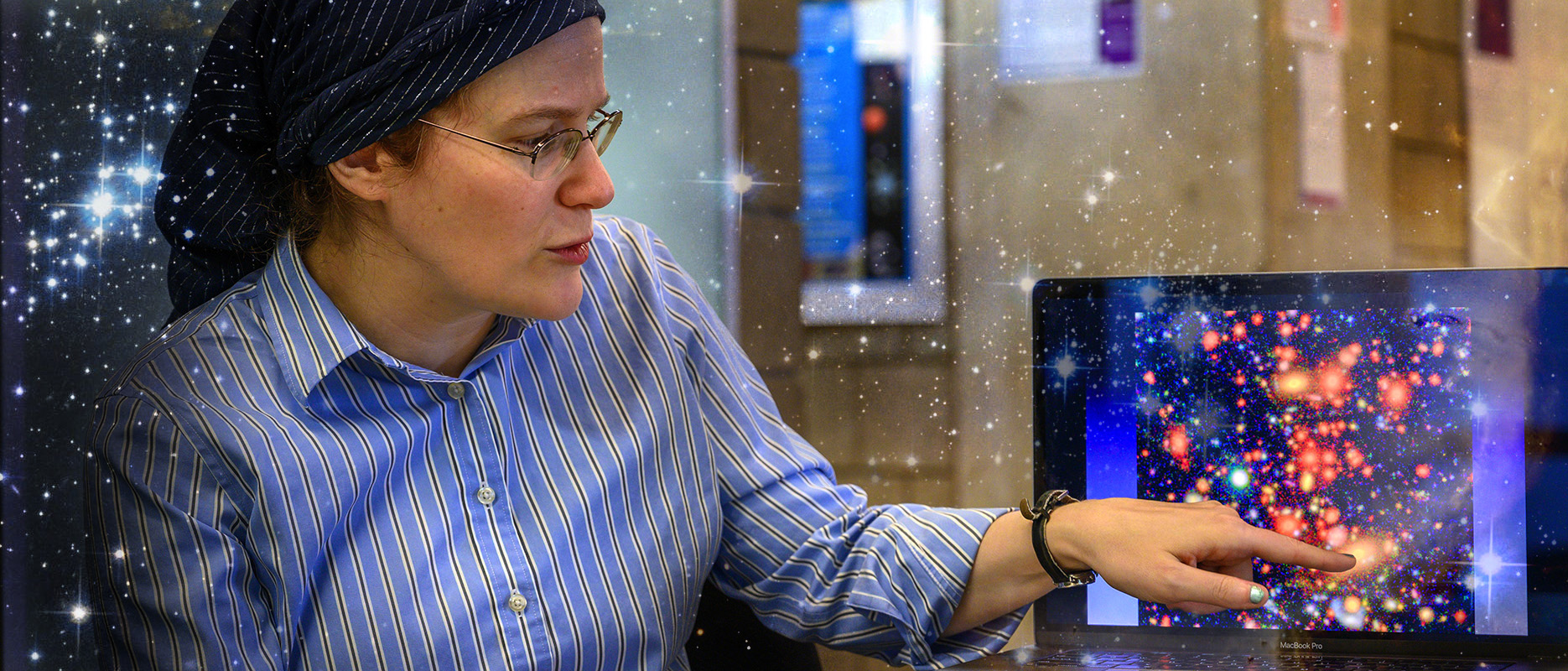

RACHEL MANDELBAUM HONORED BY
LSST, SIMONS FOUNDATION
She does this by studying weak gravitational lensing. When light from far-away galaxies travels towards Earth — and the lenses of terrestrial telescopes — it passes other objects in the universe. The masses of these objects bend the path taken by light as it travels past, resulting in distorted images. Mandelbaum studies the slightest of these distortions, which contain valuable information about how matter was distributed in the early universe and how matter evolved to the large-scale structure we see today. It also holds clues to the nature of dark matter and dark energy.
“Rachel is a leader in the field of gravitational lensing, and her work is paving the way for exciting discoveries over the coming decade,” said Department Head Scott Dodelson.
Mandelbaum, who is a member of the McWilliams Center for Cosmology, is particularly known for her work that pairs cosmological observations with computer science, statistics and data science. To accurately measure the tiny weak lensing distortions, researchers must collect data from tens of millions of galaxies. They also need to correct for other causes of blurring caused by telescopes or the atmosphere. Mandelbaum creates algorithms that take sources of observational and theoretical uncertainty into account to learn about how galaxies relate to their dark matter halos and to measure cosmological parameters from large telescope datasets.
These algorithms are used by leading astronomical surveys, including the Hyper Suprime-Cam Survey, the Large Synoptic Survey Telescope (LSST), Euclid and WFIRST projects.
Earlier this year, Mandelbaum was elected as the spokesperson for the LSST Dark Energy Science Collaboration (DESC) and began her two-year term in July. The LSST, an 8.4-meter ground-based telescope in Cerro Pachón, Chile, is in its final phases of construction and plans to collect its first commissioning data in 2021. As spokesperson, Mandelbaum will lead the DESC in the final stages of preparation for the LSST’s first observations, including overseeing its scientific, computing and technical direction and overall collaboration, as well as overseeing its finances by serving as a liaison to funding agencies.
Mandelbaum was also named a 2019 Simons Investigator by the Simons Foundation. She is the first Carnegie Mellon faculty member to be selected for this prestigious program that supports outstanding scientists as they undertake the long-term study of fundamental questions.
“We are thrilled that the Simons Foundation has acknowledged the importance of her work,” said Dodelson.
Mandelbaum will use the funding from the Simons Foundation to support her research group as it begins to explore the new datasets created by upcoming cosmological surveys.
■ Jocelyn Duffy
BENJAMIN HUNT NAMED 2019 COTTRELL SCHOLAR
Assistant Professor Benjamin Hunt was named a 2019 Cottrell Scholar in recognition of his leadership in integrating science teaching and research. Hunt is one of the United States’ top early career scientists to receive the designation from the Research Corporation for Science Advancement.
Hunt will use the support from the scholar program to further his research in the role of crystal symmetry in superconductivity and create a comprehensive undergraduate condensed matter lab that will give students the opportunity to investigate 2D materials and to create their own experiments.
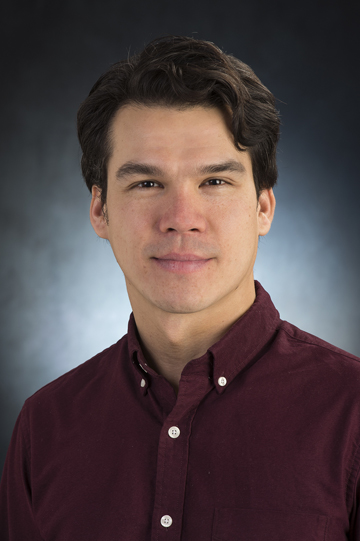
JYOTI KATOCH TO PROBE QUANTUM MATTER UNDER DOE EARLY CAREER GRANT
Assistant Professor Jyoti Katoch received a prestigious early career grant from the U.S. Department of Energy (DOE). She is one of 73 scientists to receive funding under the DOE’s Early Career Research Program.
The grant will allow Katoch to study quantum materials using advanced technologies. Specifically, she will probe the spatially resolved electronic band structure of 2D quantum materials and engineer the materials’ properties by making nanoscale perturbations in superlattices and adatoms found in the materials’ heterostructures. She will also further develop in-operando nanoARPES, an experimental technique that combines spectroscopy and microscopy to study the band structures of quantum systems under non-equilibrium conditions.
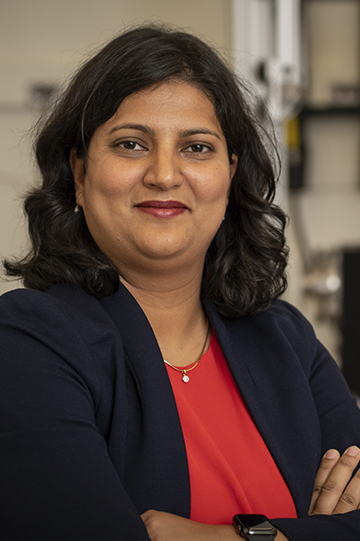
DI XIAO AWARDED SIMONS FELLOWSHIP
Professor Di Xiao has been awarded a fellowship by the Simons Foundation.
Xiao, whose research centers around quantum condensed matter theory, is using the year-long sabbatical enabled by the fellowship to study the “exotic arrangements” of electric and magnetic charges and currents found in some crystalline solids.
“My plan is to develop a theory to describe these quantum states,” Xiao said. “It is going to be a challenging problem and the Simons Fellowship will allow me to focus my time on it.”
The Simons Foundation was founded in 1994 to support research in mathematics and the basic sciences.
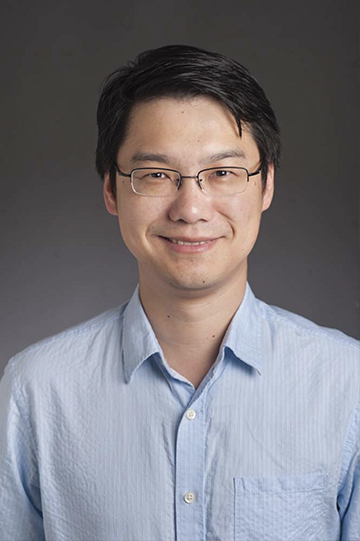

BENJAMIN HUNT NAMED 2019 COTTRELL SCHOLAR
Assistant Professor Benjamin Hunt was named a 2019 Cottrell Scholar in recognition of his leadership in integrating science teaching and research. Hunt is one of the United States’ top early career scientists to receive the designation from the Research Corporation for Science Advancement.
Hunt will use the support from the scholar program to further his research in the role of crystal symmetry in superconductivity and create a comprehensive undergraduate condensed matter lab that will give students the opportunity to investigate 2D materials and to create their own experiments.

JYOTI KATOCH TO PROBE QUANTUM MATTER UNDER DOE EARLY CAREER GRANT
Assistant Professor Jyoti Katoch received a prestigious early career grant from the U.S. Department of Energy (DOE). She is one of 73 scientists to receive funding under the DOE’s Early Career Research Program.
The grant will allow Katoch to study quantum materials using advanced technologies. Specifically, she will probe the spatially resolved electronic band structure of 2D quantum materials and engineer the materials’ properties by making nanoscale perturbations in superlattices and adatoms found in the materials’ heterostructures. She will also further develop in-operando nanoARPES, an experimental technique that combines spectroscopy and microscopy to study the band structures of quantum systems under non-equilibrium conditions.

DI XIAO AWARDED SIMONS FELLOWSHIP
Professor Di Xiao has been awarded a fellowship by the Simons Foundation.
Xiao, whose research centers around quantum condensed matter theory, is using the year-long sabbatical enabled by the fellowship to study the “exotic arrangements” of electric and magnetic charges and currents found in some crystalline solids.
“My plan is to develop a theory to describe these quantum states,” Xiao said. “It is going to be a challenging problem and the Simons Fellowship will allow me to focus my time on it.”
The Simons Foundation was founded in 1994 to support research in mathematics and the basic sciences.


